The future of Indian television lies between Naagin and Narcos
After ignoring India’s hip and young for years, media companies are going all out to win over the millennials. Now, Balaji Telefilms, the production house behind some of the country’s biggest soap operas, has entered the fray with its over-the-top service, AltBalaji.


After ignoring India’s hip and young for years, media companies are going all out to win over the millennials. Now, Balaji Telefilms, the production house behind some of the country’s biggest soap operas, has entered the fray with its over-the-top service, AltBalaji.
The app, already available on Google Play for testing, is slated to be launched on April 16 with at least six original shows in Hindi and one in Tamil. The lineup features a gay romance and a contemporary adaptation of the classic Bengali novel, Devdas—while the 1917 book was about the life and times of a wealthy man, AltBalaji’s protagonist is a rebellious 21st-century woman. Some of Alt’s other shows will star Bollywood actors like Nimrat Kaur and Juhi Chawla in the lead.
The first five episodes of all the series would be available for free on the app or the website, after which the users will have to pay Rs60 per month, much lower than the Rs600 Netflix charges in India. As of now, subscriptions would be the only revenue stream the company explores, Manav Sethi, chief marketing officer, AltBalaji, told Quartz.
Its content is a striking departure from the serials on housewives and mothers-in-law that has made Balaji and its joint managing director, Ekta Kapoor, household names in the country over the last two decades. And India, with its massive smartphone-toting young population, is ripe for a disruption in digital entertainment.
Catching ’em young
Kapoor, known as the country’s soap queen, redefined Indian TV at the turn of this century with super-hit shows like Kyunki Saas Bhi Kabhi Bahu Thi and Kahaani Ghar Ghar Kii. She continues to understand the pulse of India’s TV audience with series like Naagin, currently the most-watched Hindi show which is a supernatural drama about a shape-shifting snake. While her productions have been criticised for being wildly melodramatic and regressive, 41-year-old Kapoor has remained defiant.
“India is a country beyond south Mumbai. Somewhere these stories connect. Otherwise we wouldn’t be telling them,” she said at an event in Mumbai recently.
So why is the media magnate venturing into digital entertainment? The answer lies in India being the world’s fastest growing smartphone market, with 300 million users currently. As internet becomes faster and cheaper in the country, the smartphone is going to become the dominant screen for many Indians, most of whom live in single-TV households. A survey of 1,000 Reliance Jio customers by Bank of America Merrill Lynch showed that nearly 75% of the respondents used the free and fast data to download video.
As a result, young Indians no longer have to watch what they did on their family TV whose remote controls were with their grandmothers.
“Our shows on mobile (phones) are going to be very different and targeted at those in the age group of 18 to 45,” said Sethi.
You will not see these shows on TV, just like you won’t see Naagin on the Alt app, Sethi said, adding that he himself struggles to find quality stuff on Indian TV these days despite subscribing to an expensive DTH pack.
Late to the party
Nevertheless, Balaji has been a tad slow in stepping onto the digital platform. The last couple of years have seen frenetic activity in the sector, beginning with the launch of Star India’s Hotstar in 2015. In January 2016, Netflix began its India chapter and Amazon Prime Video arrived in December.
Despite its late entry, Balaji believes it has more to offer than any other player. “Hotstar and Voot are playing catch-up TV. They are not creating original content,” says Sethi. “If I don’t want to watch that stuff on TV, why am I going to watch it on an app?”
Netflix, on the other hand, is too expensive and only for a niche audience, he says. “We are going to be somewhere between Naagin and Narcos.”
However, “original content” is the buzzword for other over-the-top services, too. Amazon Prime Video, available for just Rs 499 a year, has said that it has 18 India originals in the pipeline, ranging from sports drama to mythological fiction. Sameer Nair, the group CEO of Balaji Telefilms admits that everyone from “big foreign boys” to local content creators like TVF is a “threat.”
In the end, “may the storytelling win,” he said.